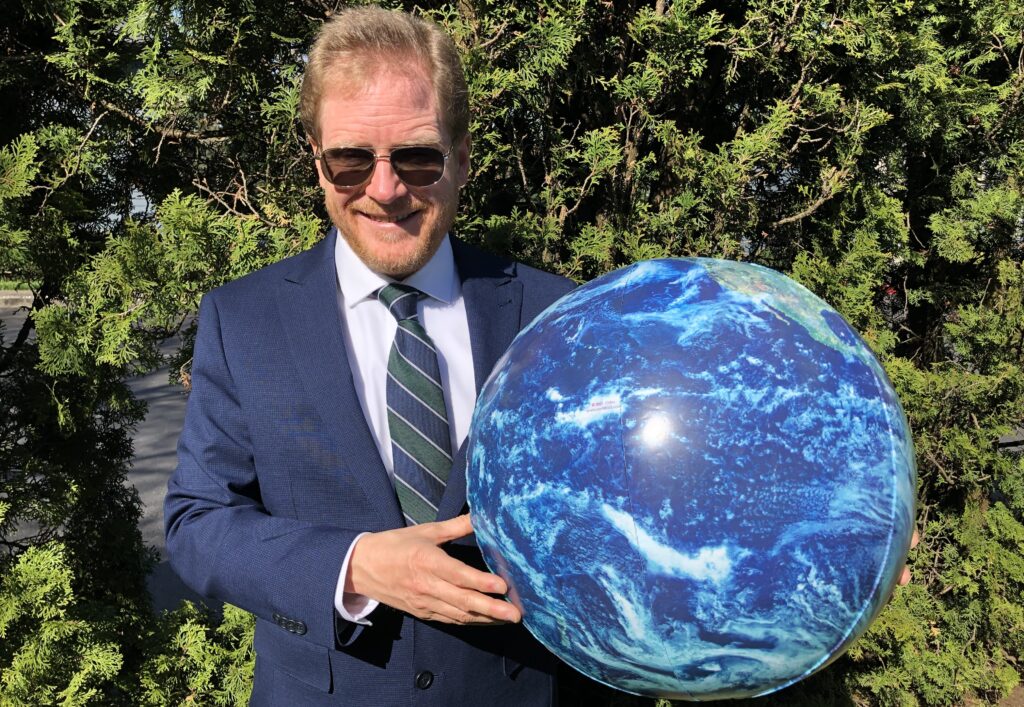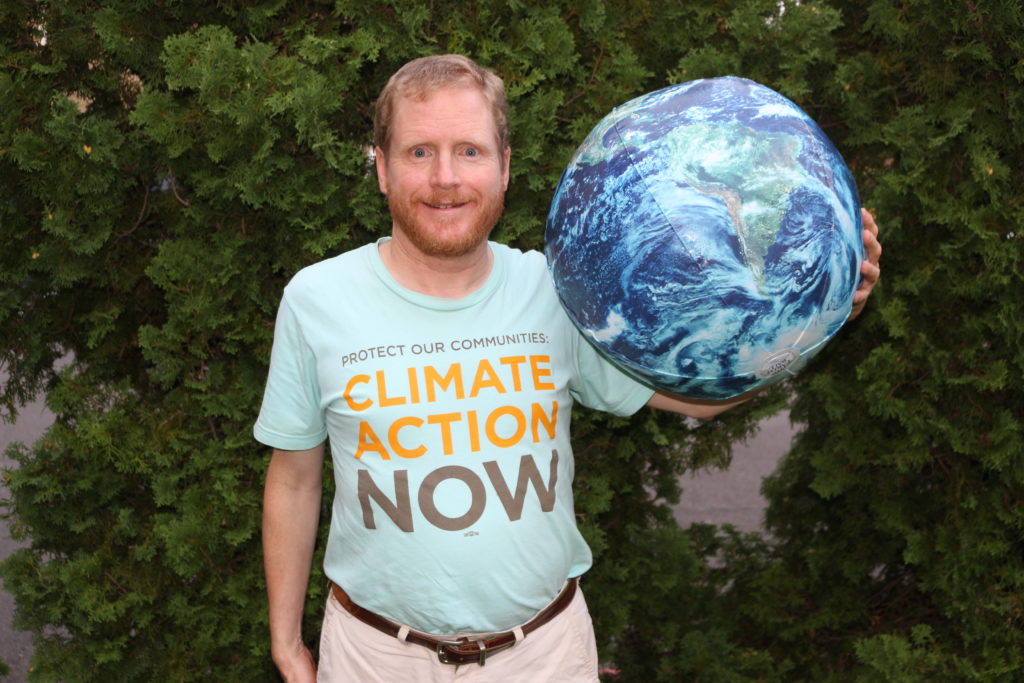
Over the past 11 years, I noticed articles on the internet and social media bout climate grief, climate anxiety, climate depression, climate despair, eco-anxiety, ecological grief, etc.
I will admit at times I felt down about climate change, including today (Please note: most of this blog was written in July 2024). My wife and I are planning a trip next week to North Cascades National Park, Washington for my birthday. As I previously blogged, Heather Meadows and Artist Point at the Mt. Baker Ski Area is my favorite place on the planet. I love the views of Mt. Shuksan and Mt. Baker there. I lost track how many times I visited there since I first saw it in 2009.
I was getting excited for this trip until a friend on Facebook who is a Fire Management Officer for the National Park Service posted about the Pioneer Fire along the northern shore of Lake Chelan in North Cascades National Park. As of July 8, 2024, the fire is only 14% contained with “continued increase in activity and spread in the days and weeks ahead.” Even worse, Level 3 (Go Now!) evacuation orders were recently issued for the areas of Prince Creek down lake to Safety Harbor. This fire putting a damper on my vacation plans is nothing compared the potential property damage with lives damaged and lost because of this wildfire.
This fire is one of many depressing reminders in the news that climate change is here and it is bad. On the news today, Hurricane Beryl made landfall in Texas causing power outages for around 3 million people and is blamed for three deaths. While this hurricane caused havoc in the Caribbean in early July, it alarmed meteorologists and hurricane trackers as “the earliest category five Atlantic hurricane in records going back around 100 years.” According to the BBC, it is a clear “sign of a warming world.”
If that is not enough, the Guardian reported on July 8th, that “US heatwave tied to four Oregon deaths as temperature records are shattered.” The article stated, “More than 146 million Americans under extreme heat alerts as dangerous weather fuels outbreak of new wildfires.” I live in Multnomah County, Oregon. that article noted, “Authorities in Multnomah county – home to Portland, where temperatures broke daily records over the weekend – said they were investigating four suspected deaths tied to the heatwave.”
The Present American ‘Democracy Crisis’ has triggered climate despair for me
For the last several years, I focused on the extreme danger to U.S. democracy. Recent events made the severity more acute that American democracy is teetering on the edge. On July 1st, the U.S. Supreme Court decided Donald Trump “has absolute immunity for core acts.” Their ruling ensured Trump would not be held legally accountable for his actions instigating the January 6th insurrection or stealing federal classified documents until after the November 5th election. The Court assisted Trump’s legal tactics to delay the voters from hearing any evidence of guilt in a court trial. Even worse, if Trump won the Presidency, he could shut down all the legal proceedings against him. Historian Heather Cox Richardson called the Supreme Court ruling “putting their thumb on the scale for Trump.” She went on to call it a “legal coup in our system.”
The maddening part is we need an American President that can communicate well and inspire confidence in the American people about the current dire threat to our democracy. Sadly, President Joe Biden failed to make that case in his June 27th debate with Donald Trump. Because of his advance age of 81, voters were not assured Biden has mental acuity to lead the U.S. during the next four years. In short, Biden’s debate performance was a disaster. It came at pivotal moment when our democracy and climate is in peril if Trump wins.
Heather Cox Richardson warned last year: ‘If former president Donald Trump is elected president or takes the presidency in 2024, we will lose American democracy for our lifetime.’
Four years ago, climate scientist Michael Mann cautioned that a second Trump Presidency would be “game over for the climate.” Last October, he reiterated that opinion with this essay in The Hill, “Trump 2.0: The climate cannot survive another Trump term.”
Ever since the January 6th attack on the U.S. Capitol in 2021, the words of Al Gore stuck in my mind that he said for many years, “To fix the climate crisis we need to fix democracy.”
Thus, for the past four years, my hair is on fire that we can’t reduce the threat of climate change if we don’t have a democracy. My climate despair, grief, anxiety, and depression since 2021 is that our climate is “doomed” and it is “game over” if we lose our democracy in the November 5, 2024 election to a wannabe strongman autocratic dictator like Donald Trump.
For my fellow climate advocates, this is not a drill! I still worry that many of them don’t get the serious situation where our democracy currently stands. I felt too many climate and environmental activists did not strongly support Al Gore for President in 2000 or Hillary Clinton for President in 2016. Instead, they spent too much time chasing shiny objects like Ralph Nader in 2000, Bernie Sanders in the 2016 Democratic primaries, or Jill Stein in 2016 general election. To win, we need to truly build a strong coalition across the political spectrum.
My frustration was confirmed in late 2023 when I read the book Facing the Climate Emergency by climate activist Dr. Margaret Klein Salamon. I wrote a blog review of the 2023 second edition of this book in March 2024, Yes, we have a Climate AND a Democracy Emergency.
In my blog review, I penned, “I did not notice a peep about this threat (to our democracy) in Margaret’s book, especially in the 2023 edition. Since January 6th, we are now aware of the daunting threat Trump poses to our democracy and climate. However, I did not see her write at all about this in her book. Furthermore, I have not seen her post anything about the threat to our democracy in her social media.”
I went on to write, “As a fellow climate organizer, I really do need Margaret (and everyone else) to address the democracy emergency in 2024 so we can then face the climate emergency.”
This was not the only blog where I tried to sound the alarm about our democracy. For the last two months of 2023, I wrote an 8 part blog, For Climate Action, let’s protect our democracy. From August 2023 to February 2023, I tried to network my contacts and post on social media for a national march for our democracy. Those efforts went nowhere.
I am not giving up. I refuse to give up for our democracy and our climate. I will get involved with political campaigns to knock on doors, phone bank, text bank, organize house parties for candidates, and do all I can to get out the vote for the November 5, 2024 election. We have too much at stake to lose. I will work as hard as I can for the upcoming election because the future of the world and America depends upon it. As I posted on social media on July 7, 2024:
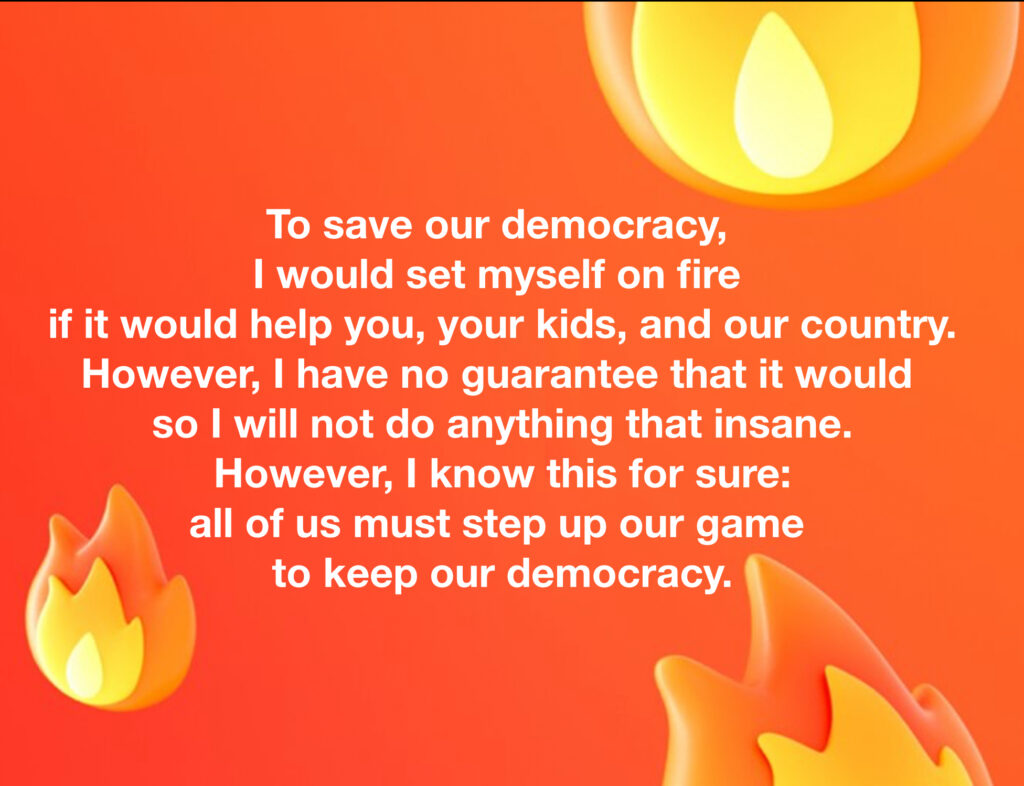
Finding my purpose to organize for climate action helped me overcome depression
To be completely honest, the democracy crisis since January 6, 2021 actually masks a deeper issue for me. I almost quit the climate movement in 2021 because I felt unappreciated and I did not matter. I felt a very deep amount of pain and hurt as a climate organizer over the years. The hurt is so deep for me that I procrastinated for months and years to write this blog.
For my 8 part blog, For Climate Action, let’s protect our democracy, I began each of those blogs writing: “This is the toughest blog for me to write.” Writing about how the bitter losses of the Presidential elections of 2000 and 2016 were extremely painful for me to write. It opened up old wounds for me to write about to try to heal from that pain. This blog cuts even deeper to write because I feel used and abused by the climate movement.
Upon self reflection, I must be candid I am a highly sensitive person and working 25 years in the national parks skewed my perception of reality. Over 98% of park visitors are kind and in awe when they see park rangers. As a park ranger, many visitors treated me like a celebrity. They wanted their photos with me. They hung on my every word. Many laughed at my jokes that were not funny. I knew it was the uniform that impressed them, not really me. It was a heady experience when so many people liked me. For the rest of my life, I am pegged by many people as a park ranger. Oddly, I have not worked as a park ranger since 2017, seven years go.
I started off as a seasonal concessionaire employee at Crater Lake National Park, Oregon in the summer of 1992 and Everglades National Park in the winter of 1992-93. I fell in love with working and recreating in the national parks. They became home for me. My happy place. A few years working in the national parks, I wanted to become a National Park Service ranger. The pay was better than working for the concessionaire, the uniform was snazzy, and rangers were well respected by the park visitors. I was fortunate to be hired as a summer seasonal entrance station ranger at Crater Lake in the summer of 1996.
I struggled with deep bouts of depression in the 1990s because I wanted to make some kind of difference in the world, but I was unsure how to do that. In January 1998, I became a concession naturalist guide narrating the boat tours in Flamingo in Everglades National Park. That helped me to find a life’s purpose and meaning to be able to chat about ecology, the environment, the Everglades wildlife and the history of the area on a daily basis.
As I often blogged and shared my story in public presentations, a turning point happened in 1998 soon after I became a concession naturalist in the Everglades. Soon after I started narrating the boat tours in 1998, visitors asked me about this global warming thing, which I had scant knowledge. Visitors hate when park rangers and naturalists tell you, “I don’t know.” Visitors expect park rangers to know everything. Don’t you?
Soon afterwards, I rushed to the nearest Miami bookstore and to the park library to read all I the scientific books I could find on climate change.
The information I learned scared me, specifically sea level rise along our mangrove coastline in Everglades National Park. Sea level rose 8 inches in the 20th century, four times more than it had risen in previous centuries for the past three thousand years. Because of climate change, sea level is now expected to rise at least three feet in Everglades National Park by the end of the 21st century. The sea would swallow up most of the park and nearby Miami since the highest point of the park road less than three feet above sea level.
It shocked me that crocodiles, alligators, and beautiful Flamingos I enjoyed seeing in the Everglades could all lose this ideal coastal habitat because of sea level rise enhanced by climate change. In the years after 1998, I was not sure what to do about climate change except reading books and watching documentaries such as An Inconvenient Truth to educate myself about it.
On October 1, 2007, my mentor, Steve Robinson passed away. He was a seasonal park ranger in Everglades and Crater Lake that I first met him in 1993. He lost his struggle to pancreatic cancer less than two month from doctors diagnosing his illness. His passing left me feeling adrift in life with a deep feeling of sadness. In the winter of 2007-08, I started work in a new location at Everglades National Park. The supervisor at Shark Valley recruited me to work there.
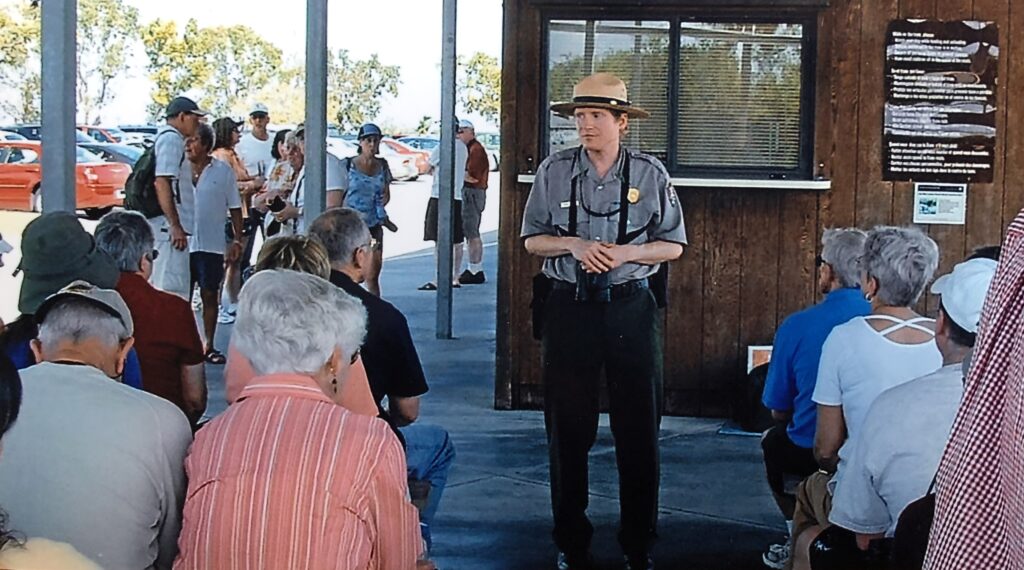
When I arrived in Shark Valley in November 2007, the new location was not a good fit for me. I felt isolated. I had a surly housemate. I missed my Everglades City friends from previous winters. On top of that, I was still deeply mourning the loss of my friend Steve.
In my sleeplessness, depression, and restlessness, I found a clear direction for my life. I decided to carry forth my mentor Steve’s message of protecting our Earth and environment since he could no longer share that vision with others. I resolved this was my final winter working in Florida. For future winters, I would stay with my parents in St. Louis and organize for climate action locally. Once I made that decision in December 2007, my depression at that time diminished.
It was dedicating my life to climate action that helped me overcome this bout of depression.
Finding Comedy in my life’s purpose to become a Climate Change Organizer
For the first several years, I had a string of successes slowly transitioning to be a climate organizer. My background as a park ranger helped open some doors.
Since I was giving up a winter job in Everglades National Park, I needed to find a job when working the winters in St. Louis. I still had my summer seasonal interpretation ranger job at Crater Lake National Park, but I wanted to secure another job for the winter. In May 2008, I visited my parents in St. Louis. I was curious about working at REI (Recreational Equipment, Inc) at their St. Louis store. I went inside the store and asked to speak to the manager. I explained my situation that I was getting ready to work for the summer at Crater Lake National Park. I asked if they would have any positions available for the winter. The manager Jon was receptive. He encouraged me to submit my application and resume to work at the store for the winter, especially for the holidays. With my park ranger background, they seemed eager to hire me for the winter since I had a background in the outdoors. REI’s business focus is selling top quality gear, equipment, apparel, and expert advice for the outdoors. Thus, this was a good fit for me to work there the upcoming winter while I tried to figure out what I would do for climate action.
REI was flexible with my winter starting date. That turned out to be ideal. I ended up working a long season at Crater Lake until October 20th. Friends I knew years earlier in the Everglades invited me to visit them on the Big Island of Hawaii. I stayed with them for the last week in October and the beginning of November. My Crater Lake supervisor invited me to attend the annual meeting of National Park Service Interpreters in the second weekend of November in Vancouver, Washington. After that conference, I started the cross country drive from Vancouver to St. Louis, arriving in mid-November. I missed the seasonal training for the holiday staff, but that did not matter for REI. They were happy to have me working for them.
I had a learning curve to be knowledgable about the REI products and this was my first retail job. REI likes for their sales floor specialists to sell their lifetime memberships. I became adept selling the memberships while engaging with customers in the store. When a membership is sold at the register, the cashiers made a coded announcement over the loud speaker. It let the management and staff know a membership was sold and who was credited for the sale. It was something like ‘224Ettling.’ I heard that announcement several times while I was working there in December 2008. A couple of times, it happened more than once during my work shift. Sometimes the announcements were not far apart. I started turning heads with my fellow employees with the memberships I sold, which boosted my confidence.
REI has a customer discount. It was retail shopping bliss to get that discount on top of reduced price sales for gear in the store. I bought a brand new winter coat for myself, which I own to this day, as well as my first car GPS unit. It was heaven to get good REI stuff while working there for their high quality outdoor products. Sadly, the good times at REI did not last after the new year. The U.S. economy was in the depths of the Great Recession. Retailers like REI had to make deep cuts in their staff to remain profitable. Since I was one of the last ones hired as a holiday seasonal staff, I was one of the first laid off from in January 2009.
It is always sad to leave a dependable job like REI. However, I was not concerned about my next job. Crater Lake hired me back in mid March to work for their spring Classroom at Crater Lake program. I enjoyed leading the snowshoe hikes for the school groups.
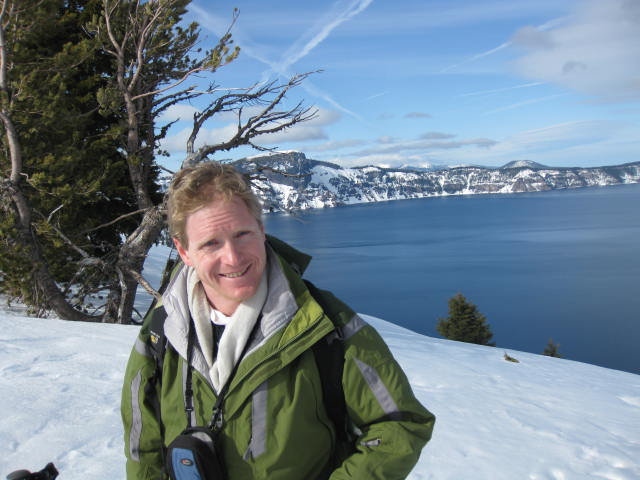
During the snowshoe hikes, a highlight was using a big snowy hill for the students to slide down. I always went first to show the students how to slide down the snow. Several occasions, the teachers and adults could not help themselves and slid down the snow. At the end the of program, I would line up the students at the top of a tall snowy embankment. I took off my snowshoes and was about 20 yards away from them. I stood on the paved road at Rim Village and dared them to hit me with a snowball. It was a fabulous workout to dodge the snowballs. The students were hilarious trying to hit me. One kid yelled at me, “Today is your funeral, mister!”
I worked at Crater Lake at my seasonal interpretation job until the end of September. During that summer, I became lifelong friends with fellow seasonal park rangers Graham Hetland and Aubrey Shaw. They lived permanently in Ashland, Oregon where they attended Southern Oregon University (SOU). Graham’s mother lived in Ashland. They needed someone to housesit for his mom, Barbara, for the winter. Barbara planned to go on a cross country road trip in a RV. Thus, they wanted someone to watch her home and her friendly cat, Poppy. I planned to return to St. Louis, but they persuaded me to housesit for their mom.
After I moved to Ashland in early October 2009, I fell into a funk because I was restless to do something for climate action. However, I had no idea what to do.
I decided to go to SOU and meet Dr. Greg Jones, an SOU professor and climatologist. He specializes in the study of climate structure and suitability for viticulture. Specifically, he studies how climate variability and climate change influence grapevine growth, wine production, and quality. At that time, I was interested in attending grad school to learn more about climate change. I was eager to see if he had any advice for me. Even more, I was curious to see if maybe I could get my master’s degree studying under him at SOU.
My meeting with Dr. Jones did not go well. I shared my background of seeing climate change in the Everglades, plus watching the 2006 documentary about Al Gore, An Inconvenient Truth. He immediately let me know he did not like Al Gore. He believed Gore was a bad spokesperson to explain to the public about climate change. That did not sit well with me because it was Al Gore and his advocacy that brought me to meet with him in his office. I left this awkward meeting I not knowing what my next step would be to pursue my climate change vision.
A few days later, I visited my friend Naomi Eklund who lived in Ashland for advice. She pressed me on what exactly did I want to do with my life. She kept pushing me harder. Finally, I snapped, “Fine! If I could do anything, I would like to be ‘The Climate Change Comedian!”
Naomi was a tough audience, but she nearly fell out of her fell out of her chair laughing. She replied: “That’s perfect! I want you to go home and grab that website domain name now, www.climatechangecomedian.com.”
I went home and did that. Barbara soon sent news that she did not like RVing across country. She decided to return to her home where I was housesitting in Ashland in mid November. When she moved back home, it felt awkward living in her house. Around Thanksgiving, Barbara announced she did not want to share her home with me. My parents just moved into a new home in St. Louis. They wanted me to return home to spend the winter with them.
On December 10, 2009, I left Ashland, Oregon for a cross country drive back to St. Louis, Missouri. During that winter, Naomi advised me to fully develop my website and create my own climate change PowerPoint that I would use for my presentations. Early in 2010, I developed my first climate change PowerPoint, “Let’s Have Fun Getting Serious about Climate Change.” I showed that PowerPoint to friends and family in the St. Louis. A family friend helped me launch my climatechangecomedian.com website that is still active to this day.
During the early months of 2010, my sisters in St. Louis wanted me to speak at my nieces’ and nephews’ schools. My younger sister first booked me to speak at my nephew Sam’s second grade class in St. Charles, Missouri on February 5, 2010. This was my first presentation outside of working as a ranger in the national parks. Before I left St. Louis in late April to return to Crater Lake, I gave several presentations to my nieces’ and nephews’ school, plus an Earth Day presentation for the nearby Catholic school, where my mom would substitute teach.
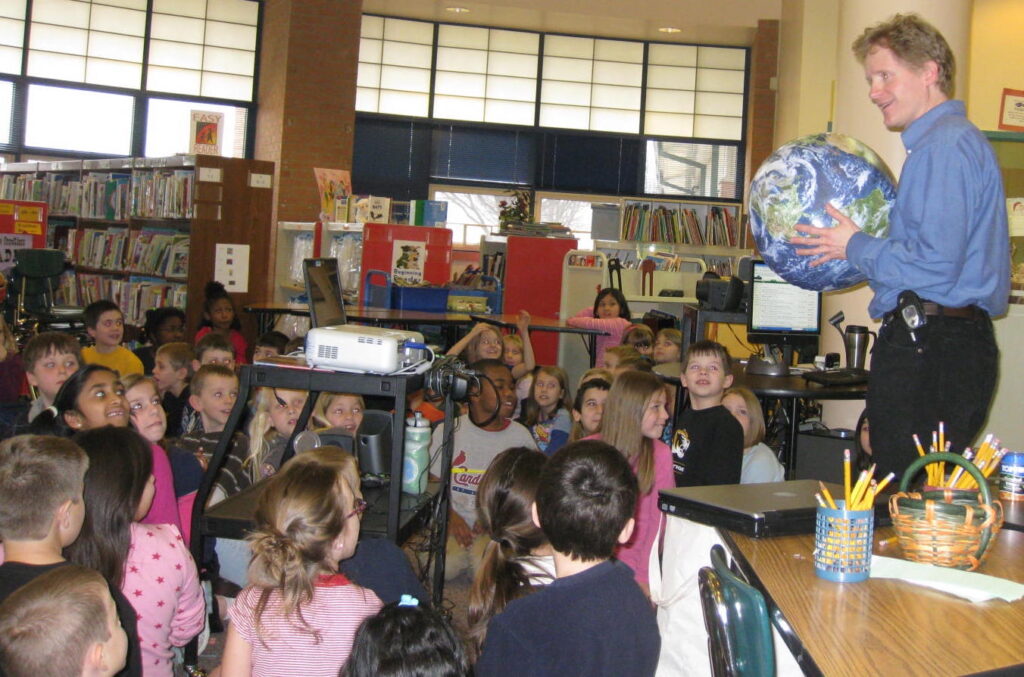
At Crater Lake National Park that summer, I gave my climate change PowerPoint informally to some of my ranger friends one evening and I shared it with a few other ranger friends. During my cross-country drive from Crater Lake National Park, Oregon to St. Louis, Missouri in November 2010, I showed this PowerPoint twice. I shared it to some ranger friends in Page, Arizona and to my college friend Brent in Oklahoma City, Oklahoma. These friends gave me some helpful tips and feedback to improve my talk.
In 2011, things started happening for me as a climate change advocate. After I returned to St. Louis for the winter of 2010-11, I wanted to improve my skills as a public speaker and climate change communicator. I joined a local Toastmasters group, South County Toastmasters, in January 2011. Over the next five years, I gave 20 climate change speeches to this local Toastmasters Club. My fellow Toastmasters voted for me as “The Best Speaker” for 8 of these speeches.
In March 2011, I had the fortuitous luck to be offered a job to work at the St. Louis Science Center’s temporary Climate Change exhibit. This was one of the few climate change museum exhibits in the United States at that time. While working there, I met St. Louis businessman Larry Lazar. We decided to co-found the St. Louis Climate Reality Meet Up in December 2011 (now known as Climate Meetup-St. Louis).
In August 2011, I gave my first climate change ranger evening program at Crater Lake National Park, called The Good, The Bad, and The Ugly. I performed this ranger talk at Crater Lake for the next five summers, up until 2017. Over the past 13 years, I ended up giving over 200 climate change talks in 12 U.S. states, Washington D.C, and Ottawa, Canada.
In 2012, I attended a Climate Reality Project Training led by former Vice President Al Gore to become a Climate Reality Leader. I loved attending that training and was honored to be a mentor for 8 addition trainings to guide others become effective Climate Reality leaders. At the May 2015 Cedar Rapids Training in front of the group of my fellow mentors, I personally asked Al Gore how to best respond to his critics.
After I became The Climate Change Comedian, I created some YouTube videos with my wife Tanya, my mom Fran Ettling and my dad LeRoy Ettling. Comedy Central’s Tosh.o noticed these videos. This TV show flew my mom and I to Los Angeles in April 2016 to appear on their episode airing on August 2, 2016. I never dreamed when I gave myself that title I would be on a TV show seen by millions of people. My 2016 guest appearance met the satisfaction of Tosh.o because they invited me back for a second time for their November 10, 2020 episode.
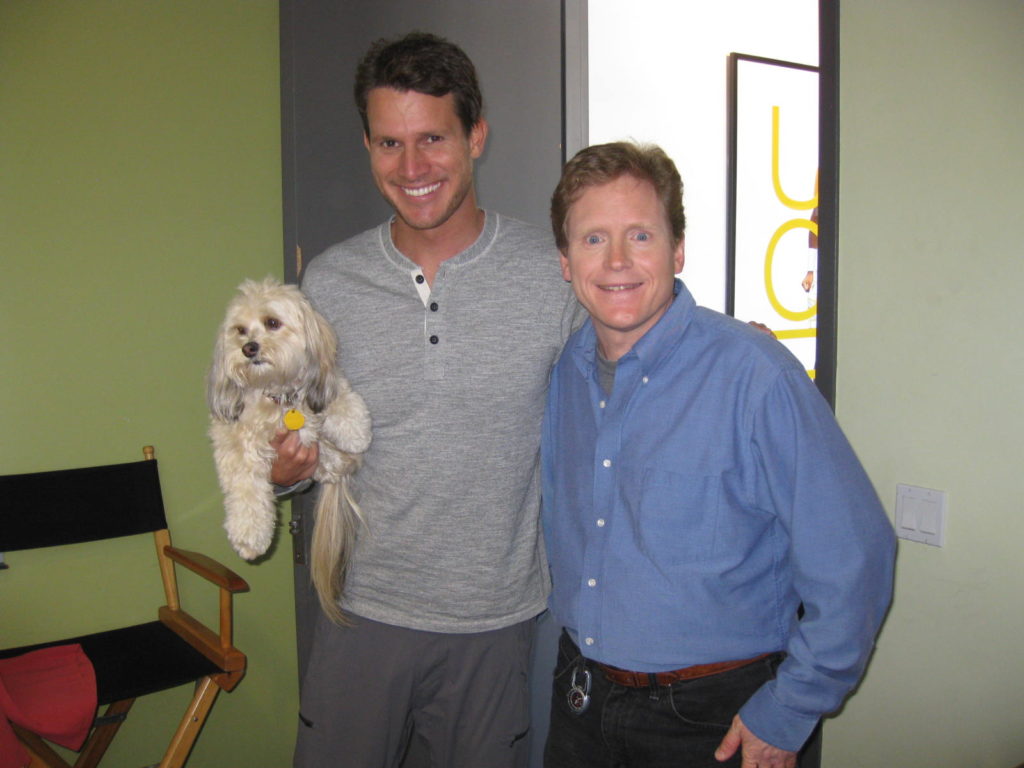
In April 2012, Carol Braford, the St. Louis Chapter Leader for Citizens’ Climate Lobby (CCL) recruited me to volunteer for CCL. I immediately became deeply committed to CCL. While working as a park ranger at Crater Lake National Park during the summer of 2012, I reached out to various climate and environmental advocates in the Ashland, Oregon area. As a result of these interactions, I co-founded the Southern Oregon CCL chapter in 2013 that still regularly meets in Ashland. In 2013, CCL inspired me to write 10 published editorial opinions, two in the St. Louis Post-Dispatch and eight in newspapers throughout Oregon.
CCL inspired me to attend 8 of their Washington D.C. conferences from 2015-19 to lobby Congressional offices on Capitol Hill. I loved attending lobby meetings with fellow CCL volunteers to urge Congressional offices to support federal climate legislation. As a climate change organizer, public speaker, and writer, it felt like 2011 to 2019 were very productive years for me.
My Frustrations and Setbacks as a Climate Change Organizer
During those same years, I had some setbacks and frustrations as a climate organizer. As the disappointments mounted, I felt more depressed and crushed that it seemed elusive for me to find a permanent and stable job in the climate movement.
In an earlier blog, I wrote about how networking and making connections I made as the co-founder of the Climate Reality St. Louis Meet Up group led to a job in late October 2013. Missouri Chapter of the Sierra Club hired me in October 2013 to be an organizer primarily for the Beyond Coal campaign. At the time, it felt like a dream come true to work full time as a climate and environmental organizer.
The job felt like it was not an ideal fit for me just days after I started. Besides the Sierra Club, I organized for Citizens’ Climate Lobby (CCL), the Climate Reality Project and I was the co-leader of the St. Louis Climate Reality Meet Up group, along with Larry Lazar. I took this Sierra Club job hoping to still coordinate with these other climate organizations. However, the job turned out to be all consuming with no time to interact with those organizations.
The St. Louis Climate Reality Meet Up had an event with a large attendance in November 2013. I hoped to go to recruit volunteers for the Sierra Club and the Beyond Coal campaign, as well as coordinate with those climate activists attending for future coalition organizing events. Sadly, my boss at the Sierra Club did not want me to attend because of a small gathering of Sierra Club volunteers scheduled to meet at the Sierra Club office that evening. I found his decision to be rather short sighted. It felt like we were just not seeing eye to eye on climate organizing.
Even more troubling, I learned that my job was an “exempt” position, not subject to the Fair Labor Standards Act’s overtime regulations and, therefore, not entitled to overtime pay. It felt like I was working morning, afternoons, and evenings with very little free time. It felt stifling and confining compared to my other climate organizing and my summer job as a park ranger at Crater Lake National Park. Around Thanksgiving 2013, I did not want to do that job anymore, so I gave my two weeks notice.
It was a huge letdown for me to get a full time permanent paid organizer position that did not work out for me. I felt free I was no longer chained to the endless demands of that job. Yet, I still yearned to work full time as a climate organizer. I set my sights to work CCL or even the Climate Reality Project. Those organizations seemed to have a better work life balance for their employees. I remember CCL’s Executive Director Mark Reynolds and other top CCL staff frequently sharing this E.B. White quote, “I arise in the morning torn between a desire to improve (or save) the world and a desire to enjoy (or savor) the world. This makes it hard to plan the day.”
In December 2013, I requested to schedule a call with Mark Reynolds to ask him how I could work for CCL. He was friendly on the phone but he gave little solid advice, wisdom, or encouragement for me. He mentioned that others were hired by CCL when they showed they created work so valuable that the organization had to hire them to keep them. Therefore, I determined I should then set out on this path to stand out as a volunteer and accomplish things big enough that CCL, Climate Reality Project, or another climate group would want to hire me.
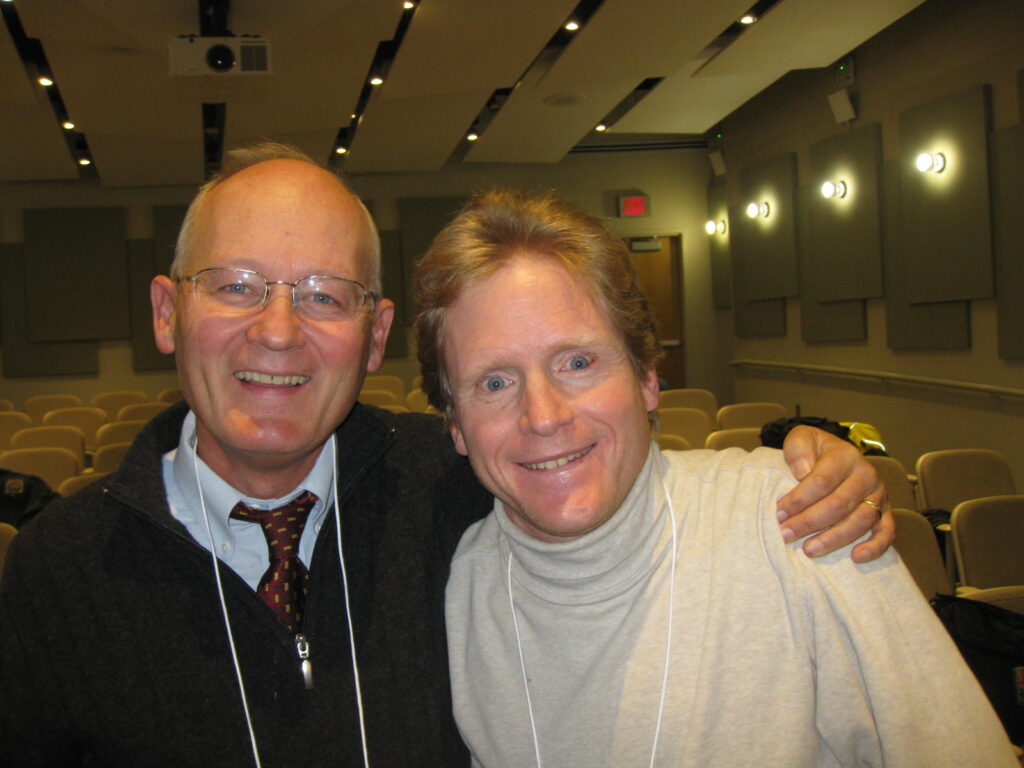
I set myself on becoming a “Super Volunteer” for CCL, Climate Reality Project and other groups. I gave hundreds of climate change talks locally and up to 12 U.S. states, participated in radio and podcast interviews, and wrote numerous newspaper opinion editorials and letters to the editor. I took on leadership roles such as CCL liaison to my member Missouri member of Congress, Rep. Ann Wagner, became co-group leader of the St. Louis CCL group, CCL co-state coordinator for Missouri. I became a breakout speaker for three Climate Reality Trainings and several CCL national conferences. I lead two Missouri CCL speaking tours in 2017 and 2018, plus an Oregon CCL speaking tour in 2017. I became interim Chair of the Climate Reality Portland Chapter in 2019. Yet, none of this seemed to matter when I applied for jobs.
I applied for a Climate Reality Project Engagement Coordinator Position in the summer of 2015. They scheduled for a job interview. I thought the interview went great. I knew the staff member interviewing me from attending some of the trainings. Yet, I never heard back from Climate Reality after that interview. I was not having much luck when I applied for jobs with climate organizations. When Tanya and I moved to Portland OR in February 2017, I knew I wanted to transition out from working as a seasonal park ranger at Crater Lake National Park to be a full time permanent climate organizer. The climate advocacy world would be different than the National Park Service world where I spent years working.
In blogs I wrote in 2017, I shared my frustration and trying to seek out mentors in Citizens’ Climate Lobby (CCL) and Climate Reality. I felt crushed when people I approached to mentor me that I deeply respected turned me down. I did not let that stop me from giving my all to the climate movement. By 2020 around the same time as the pandemic started, I felt burned and burned out by Climate Reality. When I was the interim Chapter Chair for the Portland OR Chapter during the second half of 2019, the infighting within the Leadership Team wore me out. I prevailed in the struggle to organize three big events for the chapter, but I had no energy left to lead the Chapter by February 2020.
In 2020 and for the first half of 2021, I remained a loyal and dedicated CCL volunteer. This was actually a peak time for me as a climate organizer. I led the efforts for 30 Oregon Legislators to endorse CCL’s federal bill in Congress, The Energy Innovation and Carbon Dividend Act (EICDA). Out of this effort, I was then the lead organizer for a resolution in the Oregon Legislature as Senate Joint Memorial 5 or SJM 5.
Senator Michael Dembrow proudly introduced SJM 5 on the Oregon Senate floor on February 4, 2021. This resolution called for Congress to pass a bipartisan climate carbon pricing legislation such as the EICDA. SJM 5 passed the Oregon Senate on April 7th by a vote of 23 to 5, with 6 Republican Senators, half of the Oregon GOP Senate caucus, joined all the Democratic Senators present to vote to support it. Sadly, SJM 5 fell short of receiving a floor vote in the Oregon House in June 2021. It was exciting that 30 House members, including 7 Republicans, signed on to co-sponsor it. The Oregon House has 60 members. Half the chamber was SJM 5 co-sponsors.
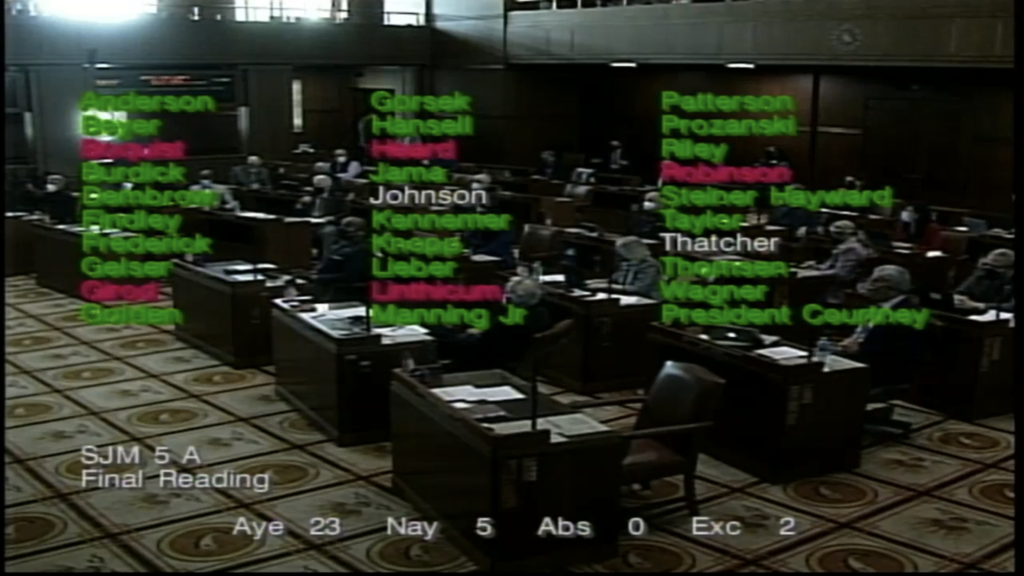
The worst part of this defeat was Oregon CCL leadership becoming very angry when the OR House Democratic Leadership refused to give SJM 5 a floor vote. After I experienced two dreadful GOP walkouts that defeated the 2019 and 2020 cap and invest bills, I never believed SJM 5 would pass until I saw it with my own eyes. The Oregonian published an opinion editorial (op-ed) from Oregon CCL leadership and I disagreed with the tone. Former Rep. Tiffiny Mitchell advised us not to publish it since it seemed to attack OR House Democratic Leadership.
I pleaded with The Oregonian and Oregon CCL leadership to re-edit the op-ed to be more gracious, but they ignored my input. Oregon CCL then organized a protest at the Capitol that I did not want to participate. It looked pointless. OR House Leadership conveyed to me in a clear message that SJM 5 would not receive a vote. The reactions of the CCL Leadership Team after SJM 5 died left me feeling disenchanted with CCL and the climate movement. In the summer of 2021, I stepped away from CCL and the climate movement. I was unsure what to do with myself since I was disillusioned with CCL, Climate Reality, and the climate movement.
With the funk I felt in the middle of 2021, I reached out to a fellow mentor in Climate Reality, Jill MacIntrye Witt. We were both trained at the Climate Reality Training in San Francisco in August 2012. I met her as a fellow mentor at several Climate Reality Trainings we attended since then. Jill works as an a Senior Instructor at Western Washington University in the Environmental Studies and Health and Human Development departments. On top of her deep involvement as a Climate Reality Leader and Mentor in 2021, she expanded into climate coaching as part of the Climate Coaching Alliance. Jill and I scheduled several coaching sessions. Her main advice to me was to journal and spend time writing about climate activism highs and lows. I resisted writing because I was in the middle of a writer’s block, defined by writing expert Mike Rose as: “the inability to begin or continue writing for reasons other than a lack of basic skill or commitment”.
In our coaching sessions, Jill grew frustrated with me that I resisted her advice. At that time, I had not blogged in over two years with my busy schedule in 2019. In 2020, I fell into a deep depression with the pandemic, lack of social interaction, and burn out from all the drama and fighting with the Portland Climate Reality Leadership Team. The first half of 2021, I focused on organizing the SJM 5 climate resolution and then it stung when it fell apart. Finally, the writer’s block damn broke around September 2021. I was writing again. As it turned out, I wrote a lot.
In autumn of 2021, I began writing a blog which turned into over 82 pages. It looked like a possible book with the title, Why I Quit the Climate Movement. However, that title and those writings felt too pessimistic. It seemed best to set those writings aside at that time. The good news is that I published my first blog in two and a half years in December 2021, Climate Action vs. “Let’s Go Brandon!”. A Facebook friend’s snarky post blaming President Joe Biden for high gasoline prices finally spurred me to blog again. I wrote three more blogs in January 2022.
Because of the January 6th attacks on the U.S. Capitol and the precarious state of American democracy, I dedicated 2022 to work on political campaigns for state legislators. I focused on electing local Democratic candidates who would protect our democracy. The good news was I found ways to get paid full time for this campaign work. I enjoyed door to door canvassing, organizing house parties, and fundraising for the Raz Mason for Oregon Senate campaign.
In September, Raz became worried about her campaign funds running too low to pay me. She encouraged me to apply to be become a full-time paid canvasser for the East County Rising (ECR) community organization. ECR is a social justice organization that focuses on getting out the vote to elect progressive Democratic local candidates for the eastern part of the Portland metro area. I canvassed full time for ECR, knocking on thousands of doors in the final two months of the campaign, up until the November 8th election.
Sadly, Raz Mason did not win her Oregon Senate campaign. However, nearly all the candidates that I canvassed for ECR won their campaigns.
In mid November 2022, I traveled to North Carolina to give climate change presentations. Robin Riddlebarger, Park Superintendent of Hanging Rock State Park, invited me to come speak at the annual conference of superintendents for North Carolina State Parks. She saw this Climate Change Comedian website. She wanted me to give a humorous talk during this conference at Hanging Rocks to the Superintendents. She wanted a fun talk from me “instead of listening to boring HR polices that could have been handled in an email.”
My presentation at Hanging Rock went great. The was my first in-person talk since the beginning of the pandemic almost two years previously. I got my groove back with this talk! I did not know when I would return to North Carolina. In October, I messaged friends I knew for decades that lived on Ocracoke in the Outer Banks if I could stay with them. They said yes. However, they insisted I ‘sing for my supper’ by giving a climate change talk to over 50 middle and high school students in Ocracoke. Thus, I gave two climate talks on this 8-day trip to North Carolina.
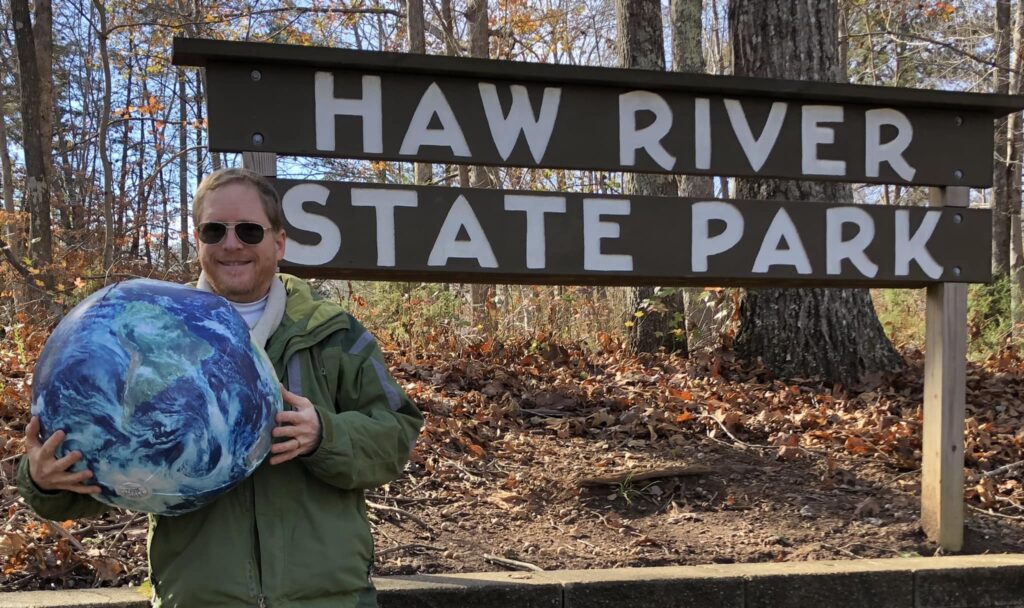
After this trip to North Carolina, I then had to figure out the job situation. I applied for some legislative aide positions in the Oregon Legislature. (Please note: the rest of this blog was written on December 31, 2024 and January 1, 2025) However, I heard back from none of the legislators when I applied to work for their staff. I felt discouraged seeking to find jobs as a legislative aide or working for Oregon climate and environmental organizations. With the approval of my wife, I spent 2023 writing multiple blogs that focused on my specific achievements as a climate organizer. My goal is to eventually turn my writings into a published memoir about my peak experiences, low points, and perspective as a climate organizer.
In January 2023, I registered for a continuing adult education class at Mt. Hood Community College called Writing Your Story. This class met every Thursday from 1 to 3 pm on Zoom. About fourteen people attended this class regularly. We read short stories we wrote about our lives. We were encouraged to keep our stories would be about five minutes in length so everyone in the class had a chance to share these stories. I loved the regular deadlines the class presented to share stories. We weren’t required to share stories, but it made for an inspiring challenge to consistently share a story. The class motivated me to regularly write my own blogs. It felt like a gift and a bit of fresh air to participate in this class with my dream to become a writer.
In the first half of 2023, I carpooled with over climate organizers to Salem, Oregon to lobby for climate and environmental bills. I joined with OLCV (Oregon League of Conservation Voters), MCAT (Mobilizing for Climate Action Together), Building Resilience and the Oregon Just Transition Alliance to lobby my legislators and other Oregon legislators to pass strong environmental and climate legislation. On one of the trips where I rode with an environmental organizer to Salem, I had a revealing conversation with one of the environmental leaders in Oregon. I remarked how I loved lobbying for climate legislation. This leader responded that the climate and environmental groups appreciate all that I do because they see me as a “Super Volunteer.”
My heart sank into my chest when I heard him say that. I feel like I was being forever boxed in and pigeon-holed as a volunteer. I wondered how I would ever break out of how everyone saw me as a “Super Volunteer” for climate organizing. I desperately wanted to get paid for my work, but it was not happening. Everyone seemed to think of me as a volunteer.
It reminded me of my life as a single man before I met my wife Tanya. I hated being single. I longed to date, fall in love, and get married to wonderful woman. I met many women whom I found to be attractive. I became friends with them. I never wanted to rush into a relationship. When I thought they could be a great match for me, I would gently let them know I wanted to take the relationship to the next level of dating. They would then rebuff me to say they wanted to “just be friends with me.” For most of adult life, I was stuck being single and “in the friendship zone” with women. I hated it, especially when I worked in the national parks. The dating opportunities were limited in the national parks. It sucked!
I gave up my winter job in the Everglades in 2008 to be a climate organizer. Even more, I hope spending my winters in an urban area of St. Louis, MO, even with living with my parents, could help me find my life partner. It worked! Within four years of leaving Everglades National Park, I found Tanya. In November 2011, I co-founded the St. Louis Climate Reality Meet Up (now called Climate Meetup-St. Louis) group to discuss, learn, and take climate action. Tanya came to one of our MeetUps in early 2012. We became friends and started dating a year later. We got engaged on Christmas Eve 2024. Our wedding was November 1, 2015. She is my best friend to this day.
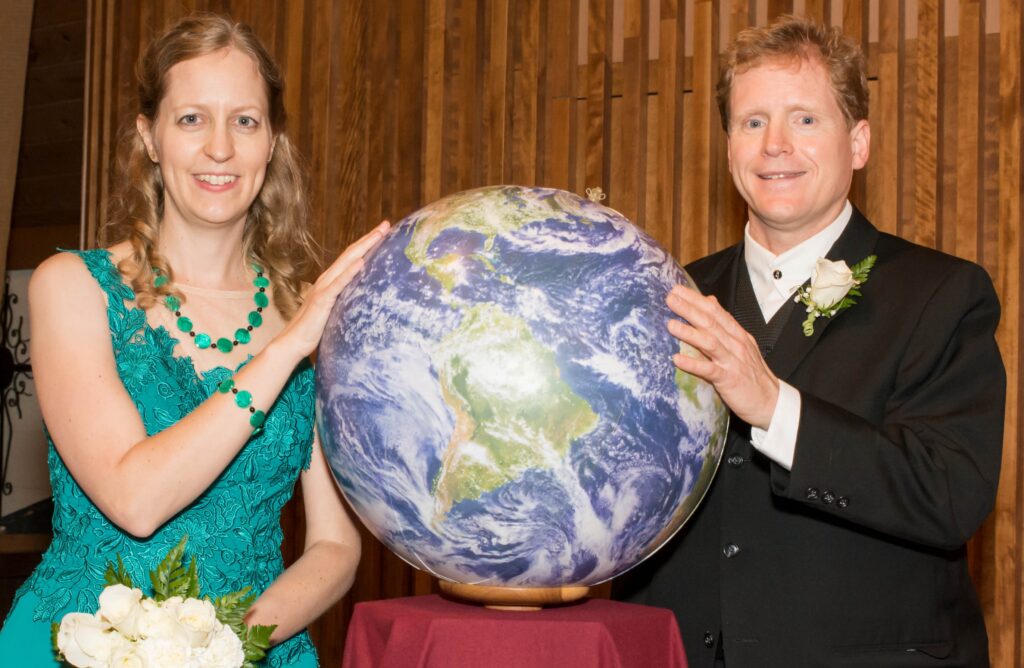
Yet, as I write this blog in January 2025, I am still stuck as a “Super Volunteer” in the climate movement. (Yes, this blog is so painful to write it took me over 6 months to write it!). To clarify, I worked as an ECR Field Organizer (paid canvasser) knocking on doors of undecided and Democratic leaning voters in eastern Portland metro area in May and from the end of July to November 5th. However, I have not yet found a job as a legislative aide or an organizer with an Oregon climate or environmental group.
Our climate and planet is too precious and sacred for me to give up. I will keep volunteering and lobbying for climate action. Yet, I am so tired of being a “super volunteer” for Oregon climate and environmental groups.
My situation reminds me of a story the late Tony Campolo wrote about in his 1997 book, Following Jesus Without Embarrassing God. Dr. Tony Campolo was a professor of sociology at Eastern University in St. Davids, Pennsylvania. He was a Baptist Minister and a leader for the progressive Christian movement. He was a sought-after speaker and a best-selling author of numerous books. Campolo was a personal spiritual advisor to President Clinton during the 1998 sexual misconduct scandal with Monica Lewinsky. I saw Dr. Campolo speak twice on campus when I was a student at William Jewell College from 1988-1992 and I read several of his books since then. Sadly, he passed away recently on November 19, 2024.
In Following Jesus Without Embarrassing God, Dr. Campolo tells the story when he pastored a church in suburban Philadelphia. A Georgia minister sent him a note that one of his most devoted families moved into Campolo’s community. This family was super devoted to the church in Georgia. Thus, this pastor believed this family would join Campolo’s church and greatly contribute to the ministries of this Philly congregation. His friend sent this family’s new address and urged Tony to go to their house and “get them” before another church invited them to join.
Thus, Tony rushed over to the house to meet this family. He rang the doorbell and the father answered. Dr Campolo introduced himself with, “Mr. Holly? I’m Tony Campolo, the pastor of Upper Merion Baptist Church. I understand you’re Baptist, and I stopped by to invite you to be part of our church. May I come in and talk to you about it?”
Mr. Holly looked shocked and fearful. He responded, “How did you find us?”
Tony replied: “The pastor of your church in Georgia wrote and told me that you moved into our community and I should do my best to get you involved in the ministries of our church.”
“Dear Lord!” he yelled. “Is there no escape? Is there no way we can have some peace and time to ourselves? Will there always be somebody out there waiting to get us and swallow us into a hundred and one church programs?”
The man then revealed how their church in Georgia almost destroyed his family. The entire family were so active in the church that they barely saw each other. The hectic schedule led to the family feeling no sense of unity and left them exhausted.
He explained, “This is a family that has been burned out by the church. We’ve had enough, already. When my company had a job opportunity a thousand miles away, I took it, primarily to escape from that church down there. And now I find that they’ve traced my whereabouts and sent you to get me involved in the same kind of rat race again. Well, thanks! But no thanks.”
Dr. Campolo reassured his church would be different, but the man was not buying it. According to Tony, “the man politely, but firmly, ended the discussion and closed the door.”
I admit this was an extreme example. However, it feels too often in the climate and environmental movement that organizations are just looking for “super volunteers.” Yes, I get they have limited funds to hire staff. However, the Bible says “Man cannot live by bread alone.” Neither can activists like me just live by volunteering. We need to find a way to get paid.
When I attend Citizens’ Climate Lobby conferences, Climate Reality Trainings, and other local environmental and climate gatherings, I frequently noticed the audience tends to be older white people (present company included). More diversity of age and ethnicity is needed for the climate movement to succeed. At the Climate Reality Training in Chicago in August 2013 where I attended as a mentor, I expressed this thought to an African American woman that mentored. She smiled and responded: ‘We ain’t gonna win if we are just pale and male.’
I thought her comment was so spot on that I immediately wrote it down on the cover of my notebook and almost fell out of my chair laughing. It was brilliant! At the same time, I wanted to add, ‘Nor are we going to win if we are just rich and retired.’
I am not opposed to fund raising if I obtained a job working for a climate or environmental non-profit. Heck, I raised over $1000 for my Facebook Birthday Fundraiser for Citizens’ Climate Lobby (CCL) in 2018. I started with a goal of $200, but I upped it to over $1000 when I blew past $200. I ended up raising over $1,137 with 35 people contributing. I prioritized fundraising for Raz Mason when she ran for the Oregon Senate in 2018. I persuaded friends, fellow Climate Reality Leaders, and family to contribute several thousand dollars to her campaign. I don’t mind helping an environmental or climate organization raise funds. I just would like to be seriously considered for paid work. I would love to get a chance to prove my value.
This leads to vital questions for all of us in the climate movement: How do you respond when someone says ‘yes’ to join the climate movement? How are you ready to receive someone into the climate movement when you have them at hello? How can you be there for them to keep them in the movement if they are not rich and retired? How can you help folks that are called into the climate movement wanting to make a difference and want to get paid doing that?
In the Bible, Jesus called his Disciples to join him by saying, “Follow Me, and I will make you fishers of men.” Then they immediately left their nets and followed Him. (Matthew 4:19-20)
What are we doing to grow the climate movement to keep recruiting activists and helping them make a living reducing the threat of climate change? The threat of climate change keeps getting worse with 2024 likely to become the hottest year on record. This will break the previous hottest year on record which as 2023. We need the climate movement to be massively expanding since we just elected Donald Trump as President on November 5, 2024 who will proudly be ‘Climate Denier-in-Chief.’ Environmental experts warn Trump will be a ‘Wrecking Ball‘ for global climate action and his Presidency poses ‘major threat to the planet.’
As a climate organizer, this is the biggest source of anxiety, depression, and grief for me: finding a way to be fully accepted into the movement to get paid to do this work as my life’s calling. I long to make a solid living following this path. I gave up a wonderful career as a seasonal park ranger to take this journey. Yet, I feel I have been kept at arm’s length by the climate movement.
Recently, I finished reading marine biologist, policy expert, and writer Dr. Ayana Elizabeth Johnson’s newest book about climate change solutions, What if We Get It Right? Visions of Climate Futures. I found her book to be uplifting with her conversations with fellow scientists, artists, farmers, organizers, thought leaders, and movers & shakers. They chat about the actions needed to strive to create a world free from human caused climate change. I recommend this book. It intrigued me to watch her recent media interviews, including her 2022 TED talk, How to Find Joy in Climate Action. It’s a must watch video answering the question: “What can I do to act on climate?”
Near the end of her TED talk, she says to her audience:
“My last challenge to you, then, since all our fates are intertwined, is in addition to leveraging your talents, can you help others in using theirs?”
Now she pointed out that inequality is “one of the major barriers to participation.” She then elaborated,
“Perhaps you know that around the world, it’s people of color who are most heavily impacted by the effects of climate change, whether that’s air pollution, hurricanes, droughts or floods. But you may not know that it is also people of color who are most concerned about climate and most likely to want to be a part of the solutions. In the US, where we have robust data on this, 49 percent of white Americans are concerned about climate, compared to 57 percent of Black Americans and 69 percent of Latinx Americans. Imagine the huge and additional contributions these folks could make if unburdened from the dangerous distraction that is racism. And goodness, do we need all of that ingenuity and leadership. In other words, help us, help you, help us all save the planet…
let’s work to demolish the societal barriers that prevent people from fully devoting themselves
to climate solutions.”
She ends with this call to action, “This is an invitation. Find your role if you haven’t already, encourage others to find theirs. Averting climate catastrophe: this is the work of our lifetimes. Thank you.”
No, I am not a young low income female person of color needing a helping hand to succeed in the climate movement. Yes, do what you can to help them as we keep building the climate movement. However, I could use your help and encouragement to live sucure as a climate organizer. I want them to succeed since it is their future at stake, even more than mine. If you can find a way to assist and be there for me, I promise I will be in a better position to help them.
Thank you so much for reading this blog to the very end that took me six months complete! I started this blog in early July 2024 and I am writing this on January 1, 2025.
